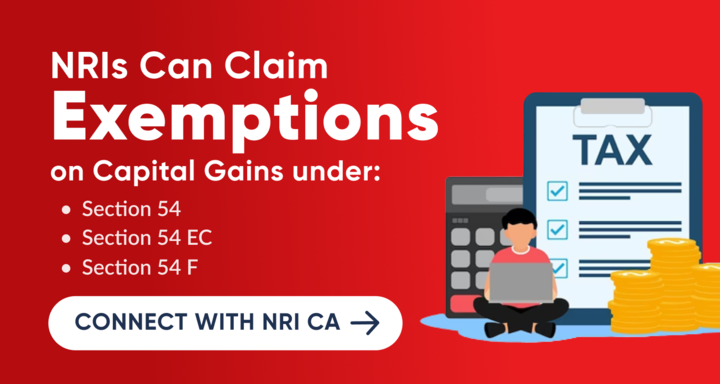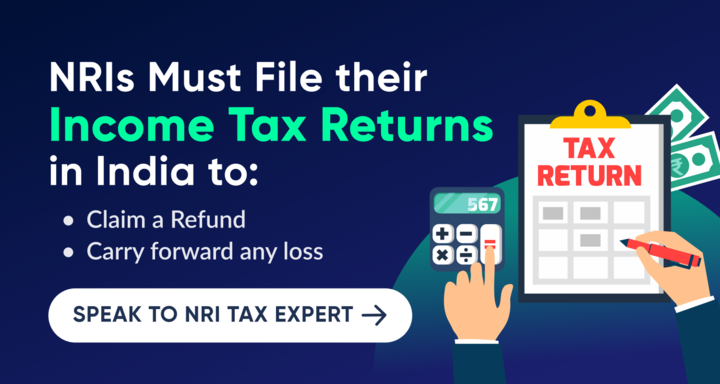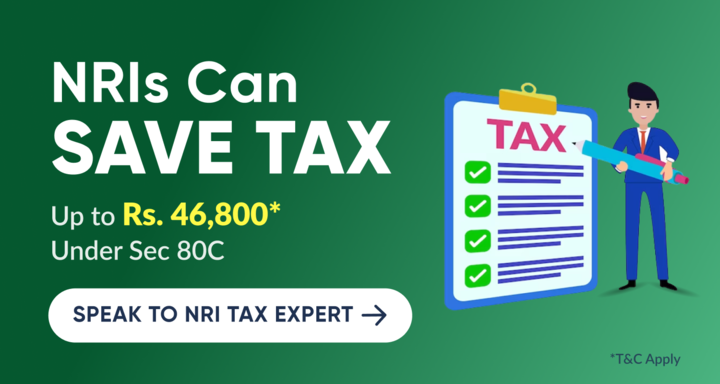As an NRI (Non-Resident Indian), you may be wondering about your tax liability on income earned in India. It is important to understand the tax rules for NRIs as they differ from those applicable to resident Indians. Let us have a look at the tax liabilities of Indian income of NRIs, availability of tax-related deductions, filing of ITR, avoiding double taxation, and other issues.

NRI Definition
Given below are the criteria for ‘Indian Resident’ and a person who does not fulfill them is a Non-Resident Indian (NRI).
- They are in India for 182 days or more in a financial year, or
- They are in India for 60 days or more in a financial year and 365 days or more in the preceding four financial years.
What Income is Taxable in India?
The income earned or received in India by NRIs is taxable in India. The taxable income for NRIs in India include:
- Salary earned in India.
- Income from house property in India.
- Income from business or profession in India.
- Capital gains from the sale of assets situated in India.
- Interest income from Indian bank accounts, fixed deposits, and other investments.
- Rental income from property in India.

Can NRIs Avail any Tax Deductions?
Yes. Similar to resident Indians, NRIs can also claim various deductions and exemptions from their income in India. For example, under Section 80C, NRIs can claim a deduction of up to Rs. 1.5 lakh for investments made in certain instruments such as ELSS, ULIPs, under Section 80TTA or claim upto to Rs.10,000 as deduction on interest income on savings bank accounts, etc.
Who is Required to File a Return of Income?
Germany, Switzerland, and UAE have their financial year from January to December, while Australia and Mauritius follow the July to June cycle, and the US operates from October to September. However, India’s financial year runs from April to March of the following year. NRIs residing in these countries need to file their Indian income tax returns and must do so within the due date of the relevant assessment year, similar to resident taxpayers.
Given that NRIs are subject to two different financial years, they need to be extremely careful in adhering to not only the tax laws of their home country but also those of India. Therefore, if an NRI’s total income exceeds Rs. 2,50,000/- in India, they must file their income tax return by opting for either the old tax regime or new tax regime on or before July 31, 2023. However, if their income is only in the form of royalty, fees for technical services, dividends, or interest or investment income on which TDS has already been deducted, they are not required to file their returns as provided under sections 115A/139.

When and How to Claim DTAA Benefits?
A Double Taxation Avoidance Agreement (DTAA) is a treaty signed between two nations to prevent the imposition of taxes twice on the same income. India has entered into DTAA with 88 countries. In accordance with the DTAA, an NRI taxpayer has to provide a Tax Residency Certificate (TRC) or form 10F. NRIs can get Form 10F from the tax authorities in the country of their residence. This ensures that their income is either exempted from taxation or taxed at a reduced rate. If the income is taxable, the non-resident taxpayer must pay the relevant taxes in India. He/she can claim the applicable tax credit against their tax obligation in their home country.
NRIs can utilize the provisions of DTAA to cover a range of activities such as services rendered, salaries earned in India, interest earned on savings bank and fixed deposits in Indian accounts, and income earned from residential property, including capital gains derived in India.

Contact SBNRI
There are various ways for NRIs to save income tax in India, but due to a complicated tax system and recurrent amendments, understanding tax laws can be confusing, especially for NRIs. NRIs may miss claiming deductions and other benefits. At SBNRI, we understand this struggle. You can download SBNRI App to connect with our NRI Tax Experts to know more about new TRC, TDS/ TCS rules for NRIs. You will also get end-to-end assistance related to NRI tax filing.
SBNRI will also help you get a lower TDS Certificate to reduce tax payable. You can also click on the button below to ask any questions. Visit our blog and YouTube Channel for more details.
FAQs
Given below are the documents required to avail the benefits under DTAA:
Self-declaration cum indemnity format
PAN card copy
Self-attested visa and passport copy
PIO proof copy (if applicable)
Tax Residency Certificate (TRC)
An individua cannot claim any benefit of relief under DTAA unless he/she provides a Tax Residency Certificate. To receive a Tax Residency Certificate, NRIs need to make an application in Form 10FA to the income tax authorities. Once the application is successfully processed, the certificate will be issued in Form 10FB.
Yes. India has signed a DTAA with Australia stipulating a 15% TDS for NRIs on the income earned in India.



